|
|
|
Sort Order |
|
|
|
Items / Page
|
|
|
|
|
|
|
| Srl | Item |
| 1 |
ID:
112545


|
|
|
|
|
| Publication |
2012.
|
| Summary/Abstract |
China's foreign policy has been characterized in the last decade by a heightened interest in reaching out to Latin America, particularly to countries rich in natural resources and with potential markets for Chinese exports, and Chile is one of these countries. The paper shows that even though the Chilean economy has benefitted from the signing of the FTA, it also faces potential risks. To continue to benefit, Chile needs to boost exports in other potential export sectors (value-added products or services) and should attempt to attract more Chinese FDI to Chile's export industry. The export of raw materials (particularly non-renewable ones) is not always sustainable in the long term. The roles of the Chilean state and the private sector in attracting Chinese investment and enhancing diversification of exports of value-added products are crucial for the future of the economy of Chile and its relationship with China.
|
|
|
|
|
|
|
|
|
|
|
|
|
|
|
|
| 2 |
ID:
112542
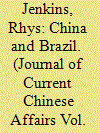

|
|
|
|
|
| Publication |
2012.
|
| Summary/Abstract |
The paper analyses the economic impacts of China's re-emergence on Brazil, looking at both the direct effects of China on Brazil in terms of bilateral trade and investment flows and the indirect effects through increased competition in export markets for manufactured goods and higher world prices for primary commodities. Despite a surge in Chinese FDI in Brazil in 2010, the main driver of bilateral relations is trade. While bilateral trade has grown rapidly, the pattern that has emerged has given rise to concern because Brazil's exports are concentrated in a small number of primary products while imports from China are almost entirely of manufactured goods that are becoming more technologically sophisticated over time. Brazil has benefitted in the short term from the high prices of primary commodities (partly caused by growing Chinese demand), but has lost export markets to China in manufactures, contributing to the "primarization" of the country's export basket.
|
|
|
|
|
|
|
|
|
|
|
|
|
|
|
|
| 3 |
ID:
112541
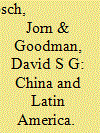

|
|
|
|
|
| Publication |
2012.
|
| Summary/Abstract |
The rise of China is not a new phenomenon. The PRC's growing economic (and in a number of cases also political) involvement in Southeast
Asia and particularly in sub-Saharan Africa has caught the attention of
academics and policymakers alike. However, China's emergence as an
important actor in Latin America has only recently appeared on the radar
screen of the scholarly community and is still an under-researched area.
Eight years have passed since Chinese President Hu Jintao's first tour of
Latin America in November 2004, marking the beginning of a new phase
in Beijing's trans-Pacific relations. The significant boost in Chinese-Latin
American trade provides strong evidence for the importance of this
emerging pattern of interaction. China's trade with the region reached
180 billion USD in 2010, evincing not only an increase of 50 per cent
from 2009 but also a pattern of sharp growth since 2000, when the China-Latin America trade volume stood at just 13 billion USD. By 2007
bilateral trade had already exceeded Hu's original target of 100 billion
USD, set for 2010 (China Daily 2011; Xinhua 2008). The articles in this
issue of the Journal of Current Chinese Affairs bear strong witness to the fact
that this budding relationship has been driven mainly by a mutual desire
to accelerate economic exchange.
|
|
|
|
|
|
|
|
|
|
|
|
|
|
|
|
| 4 |
ID:
112546
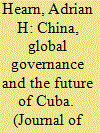

|
|
|
|
|
| Publication |
2012.
|
| Summary/Abstract |
China's deepening engagement with Latin America has been accompanied by concerns about the Chinese government's regard for international conventions of economic governance. Critics claim that across Latin America and the Caribbean, Chinese aid and trade are characterised by excessive state intervention. This article argues that, for two reasons, the rationale for these misgivings is dissipating. First, since the onset of the global financial crisis, China has gained influence in multilateral institutions, prompting them toward greater acceptance of public spending in developing countries. Second, recent developments in Cuba show that China is actively encouraging the Western hemisphere's only communist country to liberalise its economy. China sits at the crossroads of these local and global developments, prompting Cuba toward rapprochement with international norms even as it works to reform them.
|
|
|
|
|
|
|
|
|
|
|
|
|
|
|
|
| 5 |
ID:
112543
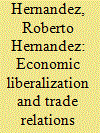

|
|
|
|
|
| Publication |
2012.
|
| Summary/Abstract |
This paper analyses the commercial relationship between Mexico and China in the context of the liberalization policies enacted by both countries. The policies were developed in the framework of economic globalization and worldwide strategic military power, starting from the end of the Cold War. Against this backdrop, the paper analyses the current trade relations between China and Mexico. The text emphasizes the public policy of both countries, presenting similarities and asymmetries along with the results of their commercial policies and specific business practices.
|
|
|
|
|
|
|
|
|
|
|
|
|
|
|
|
| 6 |
ID:
112544
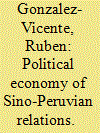

|
|
|
|
|
| Publication |
2012.
|
| Summary/Abstract |
This article reviews dependency postulates and examines whether they are applicable to explain the political economy of China's contemporary relations with Peru. It argues that the dichotomy between Peru as a commodity-providing periphery and China as a core manufacturing centre is insufficient to explain the ways in which power is embedded in the international economic system, and particularly inadequate to identify winners and losers in the international division of labour. Thereby, in line with some recent international political economy discussions of power, the article proposes that China should not be understood as a self-contained economic entity, but as a hub where natural resources are mobilized for transnational production. Furthermore, contending that a focus on nation-states fails to capture the complexity of (under)-development dynamics, it suggests that notions of internal colonialism, flexible sovereignties and postcolonial analyses of representation provide fresher perspectives from which to understand the distribution of power along the political economy of Sino-Peruvian relations.
|
|
|
|
|
|
|
|
|
|
|
|
|
|
|
|
|
|
|
|
|